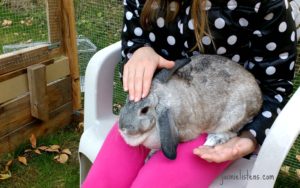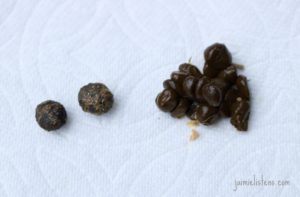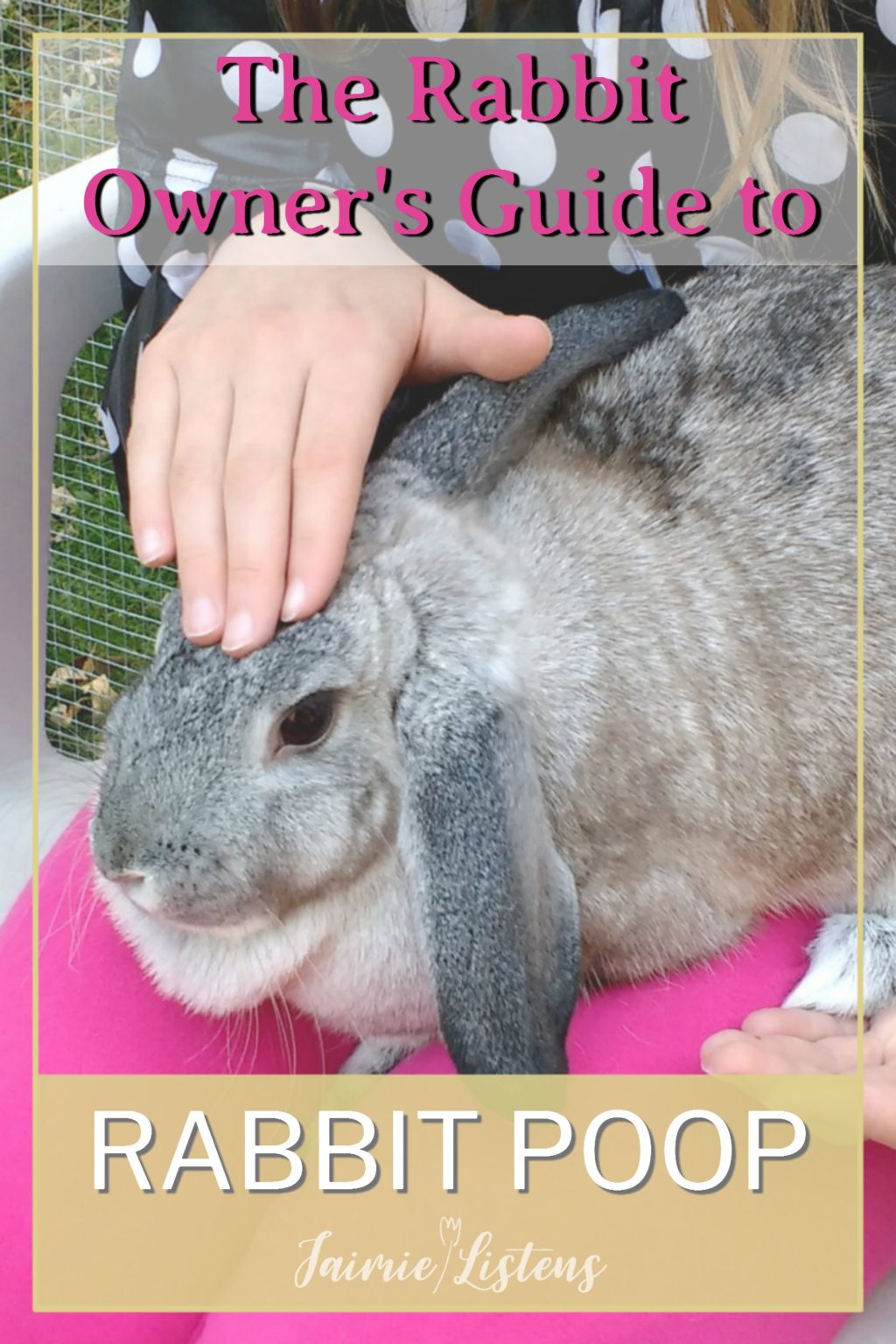If you have or are considering adopting a pet bunny rabbit, there are some things you really need to know about rabbit poop. Not only do rabbit droppings serve a dual purpose for your bunny, it also has several benefits for you the owner!

When I took home my very first Rex rabbit I was completely clueless on so many aspects of rabbit care. I know this is totally going to age me, but it was when the internet was only for serious computer nerds and most people hadn’t even heard of it. It was back when you had to look at those ancient bundles of paper and ink called books. So, even though I bought a book to get myself knowledgeable about bunnies, I didn’t have nearly the amount of information I do today.
I have owned bunnies off and on for over two decades, and with that experience plus loads of good info on the web, have truly come to appreciate these furry little creatures!
Warning! This may not be a suitable read if you are munching on a snack or a meal, so get all finished and then proceed to read on. Just in case the title wasn’t enough of a heads up. 🙂
When I first started off, I noticed that my bunny would appear to eat her droppings right from the source (to try and put it delicately) and I thought it was similar to the issues dogs have when they snack on their own factory outputs.
Later, I found out that rabbits actually produce two kinds of droppings. The first kind is regular waste and looks like dry cocoa puffs. (Aren’t you glad you finished your cereal before reading this far!) It is the rabbit’s normal waste disposal system.
The second kind is called cecotropes (see-ko-tropes) and is loaded with nutrients and healthy gut flora (if your bun is healthy). These are the droppings that your bunny is actually eating. They are sometimes called “night droppings” because it is often at night that they do this. The reason they do this is to better utilize scarce resources and get as much nutrition as possible from their food. (Winters tended to be pretty rough for the domesticated rabbit’s ancestors who originated from the European rabbit (Oryctolagus cuniculus), not to be confused with the eastern cottontail (Sylvilagus floridanus) that is native to North America.) This activity is similar to a cow chewing its cud. One species eats its regurgitation and the other something slightly more unappetizing. And that, my dear readers, is one more reason kids are absolutely fascinated by animals! They do some pretty strange things.
Comparison between regular rabbit droppings on the left and cecotropes on the right:

Cecotropes also serve a third purpose, in addition to waste disposal and nutrient maximization. When mamma bunny (the doe) gives birth to a litter of baby bunnies (kits), she will eventually leave some of these in the nest for the kits to “snack on” when they are a few weeks old. This is one of the ways baby rabbits populate their guts with the proper bacteria to digest the food that mom is eating locally.
And, just for the record, I don’t think the bunnies enjoy eating these. Their eyes glaze over and they get this really bored and half-disgusted look on their faces that seems to say, “This isn’t fun, but for some reason I just gotta do it.” If you own pet rabbits, you know what look I am talking about.
For the rabbit owner, your rabbit’s droppings are an excellent indicator of rabbit health.
They will clue you in on a potential sickness, or whether or not any new food being introduced isn’t agreeing with your bunny.
For example, if you see feces with large amounts of hair and it’s all strung together like beads, it is a sign that your bunny is swallowing a lot of fur and would benefit from more brushing, more hydration with leafy greens and more fiber from timothy hay. If your bunny has diarrhea, he or she may be sick, or maybe a food you gave was too rich or sugary. One of my bunnies has a really sensitive digestive track and I have to be really careful what I feed him or he will get mushy cecotropes.
Another problem I saw with one of my bunnies was the passing of a clear jelly-like material. This was from a blockage and hinted at lots of straining activity. If you do think your rabbit may have a blockage, immediately remove pelleted foods, provide lots of hydration through water and rabbit-safe greens and give them access to fresh timothy hay. You also need to contact your vet right away, because a blockage is serious business and can kill your bun if not addressed quickly! The number one way to help your bunny is hydration, but the vet can give you some herbal suggestions and other things to get the poop train moving again.
The second benefit rabbit owners get from rabbit poop is free fertilizer!
Rabbit manure is one of the absolute best fertilizers for your flower or vegetable garden. It is approximately 2 percent nitrogen, 1 percent phosphorus and 1 percent potassium, and can be composted or used directly around your plants by working it into the top inch of the soil. Michigan State University has a great article all about it. (Link: http://msue.anr.msu.edu/news/bunny_honey_using_rabbit_manure_as_a_fertilizer)
So if you are like me and love to garden, you can either compost your rabbit poop or work it directly into your garden. I even put my rabbit manure in my worm compost bins! The worms love it and they break it down even further for the garden. So, I guess that is another great use for rabbit poop – worm food. Now, how many pet owners can say that their pets produce that type of output? It’s like having a few geese that lay golden eggs!
Rabbits happen to be pretty amazing creatures! Just don’t forget to share some of that delicious garden bounty that they helped grow. We have come to the end of our rabbit dropping exploration. You may now proceed to eat that bowl of cereal.

Disclaimer: Jaimie is not the great and powerful Wizard of Oz, a lawyer, a doctor, a veterinarian, or a CPA. Nothing your read in my blog is a substitute for professional advice and doing your own good research. Remember that just because someone has credentials doesn’t guarantee their advice is golden or perfect. Put your smart hat on and do your due diligence. Good luck!

Should I compost the droppings before using them on food plants? Thank you
Hi, Kim. You don’t have to, but if you are concerned with contamination you definitely can compost it first. I like to load it into my worm bins and let the worms compost it, then add it to my vegetable plants.
Thank you for all the information! My bunny is pregnant and I feel much more informed and prepared than I was when she had her first litter. We lost all those babies. 😔 I think we will have a much better chance this time!
You are welcome, Sue! I’m so sorry you lost the first litter. That must have been tough! Yes, having good information can really help, especially when you have little time to figure things out.